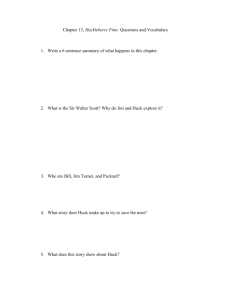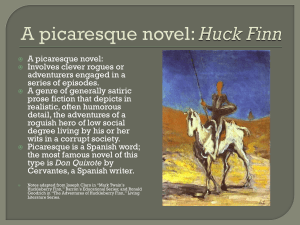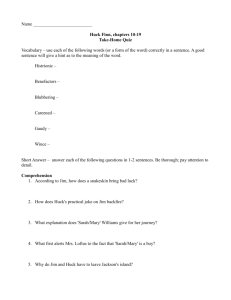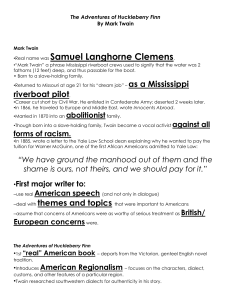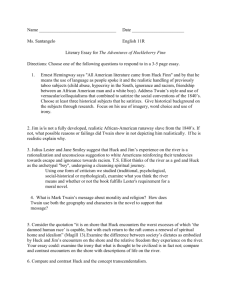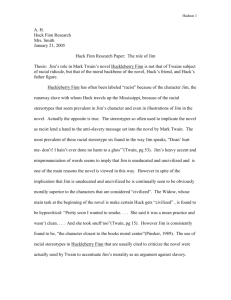Racism in The Adventures of Huckleberry Finn
advertisement
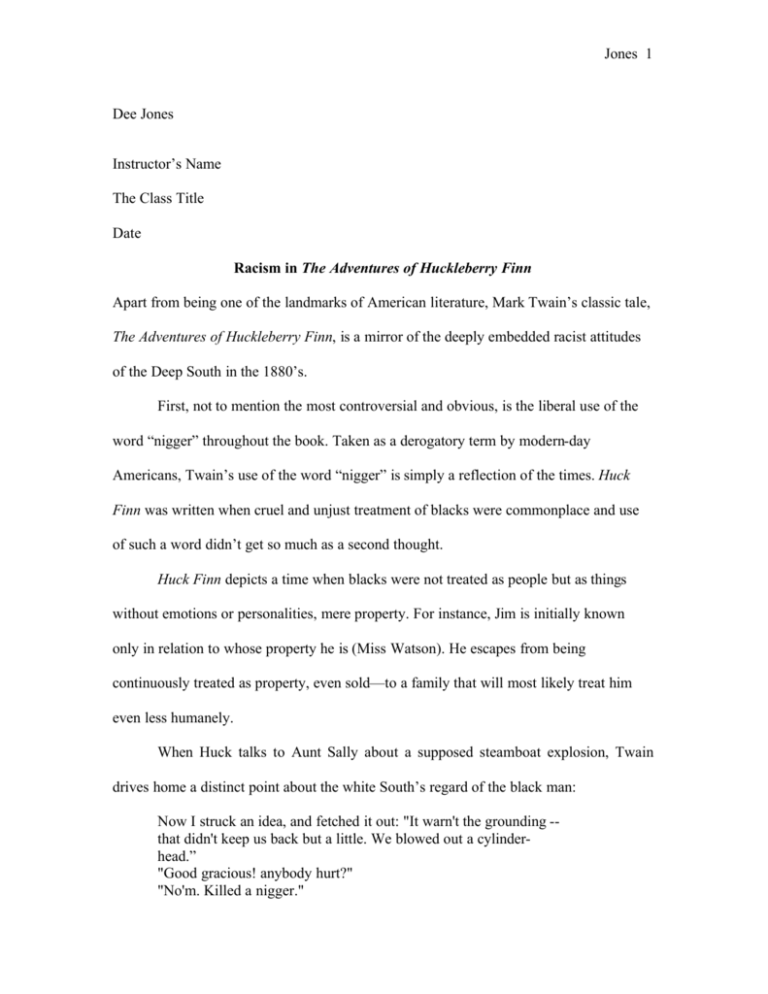
Jones 1 Dee Jones Instructor’s Name The Class Title Date Racism in The Adventures of Huckleberry Finn Apart from being one of the landmarks of American literature, Mark Twain’s classic tale, The Adventures of Huckleberry Finn, is a mirror of the deeply embedded racist attitudes of the Deep South in the 1880’s. First, not to mention the most controversial and obvious, is the liberal use of the word “nigger” throughout the book. Taken as a derogatory term by modern-day Americans, Twain’s use of the word “nigger” is simply a reflection of the times. Huck Finn was written when cruel and unjust treatment of blacks were commonplace and use of such a word didn’t get so much as a second thought. Huck Finn depicts a time when blacks were not treated as people but as things without emotions or personalities, mere property. For instance, Jim is initially known only in relation to whose property he is (Miss Watson). He escapes from being continuously treated as property, even sold—to a family that will most likely treat him even less humanely. When Huck talks to Aunt Sally about a supposed steamboat explosion, Twain drives home a distinct point about the white South’s regard of the black man: Now I struck an idea, and fetched it out: "It warn't the grounding -that didn't keep us back but a little. We blowed out a cylinderhead.” "Good gracious! anybody hurt?" "No'm. Killed a nigger." Jones 2 "Well, it's lucky; because sometimes people do get hurt.” (Twain 241) These few lines of dialogue say all there is to say about how blacks are viewed at that time: that they are “nobody”, less than human, with lives that are of little or no value to anyone. The racist attitudes of the South are most evident in the character of Huck Finn himself, and how he relates to the runaway Negro slave, Jim. Huck is but a product of his environment and upbringing. Although he reflects the cruelty and injustice of the South towards blacks, he is totally unaware that this is the wrong attitude to take (Fiskin 2) So at first, he is unsure how to deal with Jim. He first displays attitudes that are a reflection of his times. He plays tricks on Jim and entraps him in dialogue that makes the latter appear especially foolish—or perhaps, to make Jim painfully aware of his own inferiority. The trick that weighed most heavily on both Huck and Jim is when, after having disappeared from the raft, Huck pretends to have been there all along. The worried Jim insists that he believed Huck had almost drowned, but Huck plays Jim for a fool, tricking him into believing that he had only been dreaming. Jim, in turn, is made to appear as the Negro stereotype of the times: a backward buffoon with his slave dialect and many superstitions (Gregory 2). It is only much later on that he takes on a more human face as we discover his admirable character, particularly his fierce loyalty to his friend Huck (MacLeod 12). Huck also reflects the white South’s belief that blacks were vastly inferior. In the conversation about King Solomon and the Frenchmen in Chapter 14, Huck ends the conversation by saying to himself: “I see it warn’t no use wasting words – you can’t learn Jones 3 a nigger to argue. So I quit” (Twain 104). Seemingly frustrated with the turn of the conversation, Huck ends up being dismissive of the black man’s intellectual capacity – his ability to learn, see reason or think rationally. Again, this points to the white South’s inherent belief that the black man is inferior. Early on in their relationship, Huck is also prone to saying things that further show how deeply racist attitudes have been ingrained in him. After the trick he plays on Jim, he is reluctant to apologize to someone society dictates is far beneath him: “It was fifteen minutes before I could work myself to go and humble myself to a nigger” (Twain 107). Jim must also accept the fact that as a black, he is inferior to whites in these times. Friendship doesn’t negate this rule of society; even his good friend Huck is far superior to him. Even as far into the book as Chapter 31, Huck still holds himself accountable to the strict racist rules of his community, where empowering a black man is a “low-down thing”: And then think of ME! It would get all around that Huck Finn helped a nigger to get his freedom; and if I was ever to see anybody from that town again I'd be ready to get down and lick his boots for shame. That's just the way: a person does a low-down thing, and then he don't want to take no consequences of it (Twain 219). However, in the course of the tale, Huck’s attitude toward his black companion begins to shift. This is a struggle for him at first, and a reader gets a definite sense of Huck grappling with how society has always forced him to think. For example, although he shows reluctance in apologizing to Jim for his trick, he really does feel like the trash Jim likens him to (Twain 107). Not only does he get over his reluctance and apologizes to Jim, but makes a firm pledge to himself not to “do him no more mean tricks; and I wouldn’t done that one if I’d knowed it would make him feel that way” (Twain 107). Jones 4 Another instance is when Huck encounters a group of white men looking for runaway slaves. He struggles momentarily about the morality of hiding Jim, still thinking of the latter as a stolen piece of property and not a person. However, he swings the other way and conceals Jim from the men with a clever ruse (Twain 117). In the end, after a long and hard struggle, both Huck and Jim achieve a certain degree of freedom. Not just freedom from “sivilization” for Huck and slavery for Jim, but freedom from the rigid mindset of the racist South. Huck learns to look at Jim not merely as a Negro, a piece of property or someone inferior and worthless, but as a human being and as a friend. Jones 5 Works Cited Gregory, Leslie. “Finding Jim Behind the Mask: The Revelation of African American Humanity in Mark Twain’s Adventures of Huckleberry Finn.” Ampersand Volume 1 Issue 1 (1998). 4 Apr. 2005 <http://itech.fgcu.edu/&/issues/vol1/issue1/huckfinn.html>. Fiskin, Shelley Fisher. “Teaching Mark Twain’s Adventures of Huckleberry Finn”. Huck Finn Teacher’s Guide/Culture Shock. 1999. PBS. 4 Apr. 2005 <http://www.pbs.org/wgbh/cultureshock/teachers/huck/essay.html>. ---. Was Huck Black? Mark Twain and African-American Voices. New York and Oxford: Oxford University Press, 1993. MacLeod, Christine. “Telling the Truth in a Tight Place: Huckleberry Finn and the Reconstruction Era.” The Southern Quarterly 34 (1995): 11-12. Twain, Mark. The Adventures of Huckleberry Finn. New York: Penguin, 1986.

